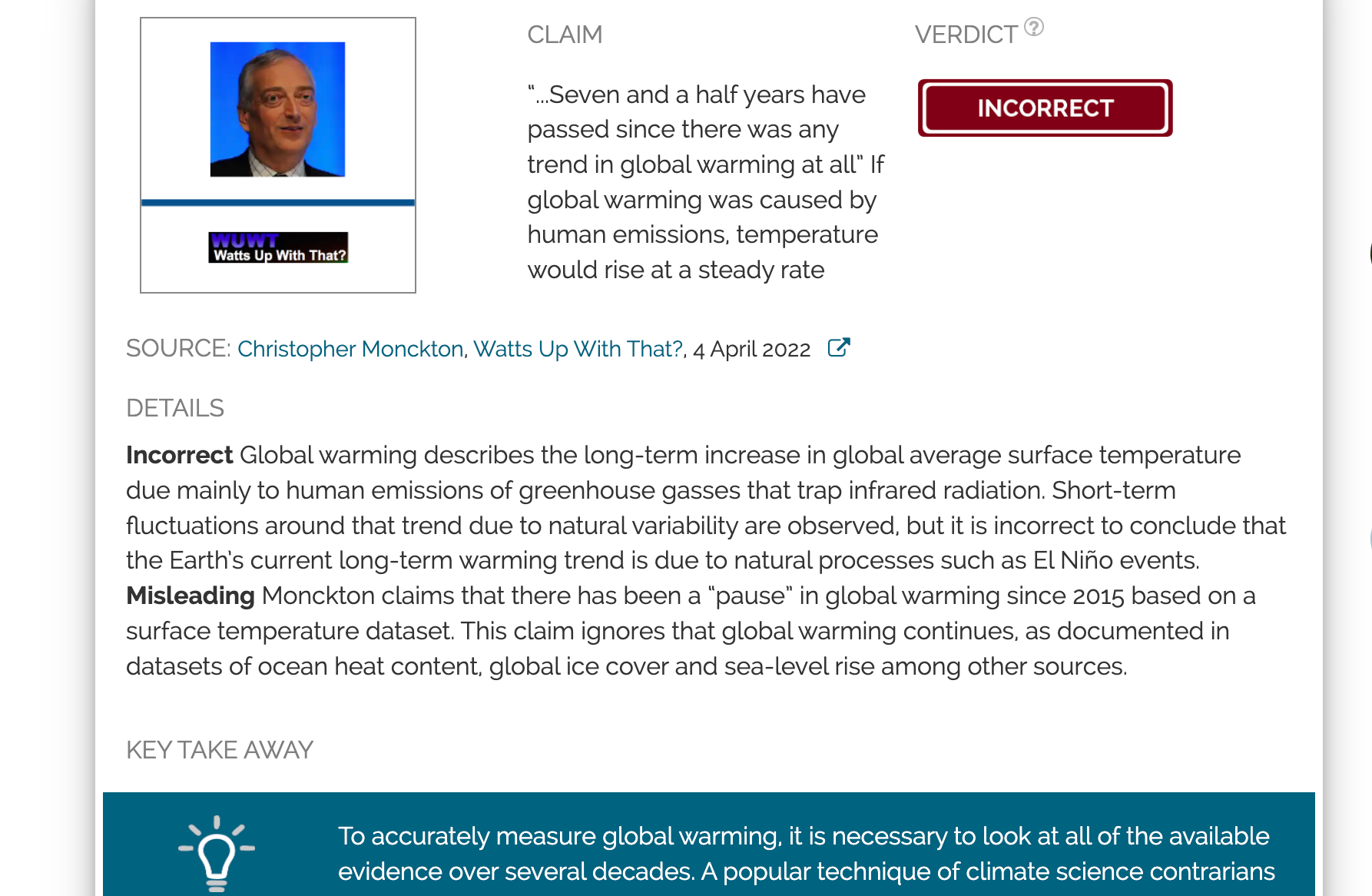
Earth’s surface continues to warm due to greenhouse gas emissions, contrary to claims by Christopher Monckton in Watts Up With That
Claim:
“...Seven and a half years have passed since there was any trend in global warming at all” If global warming was caused by human emissions, temperature would rise at a steady rate
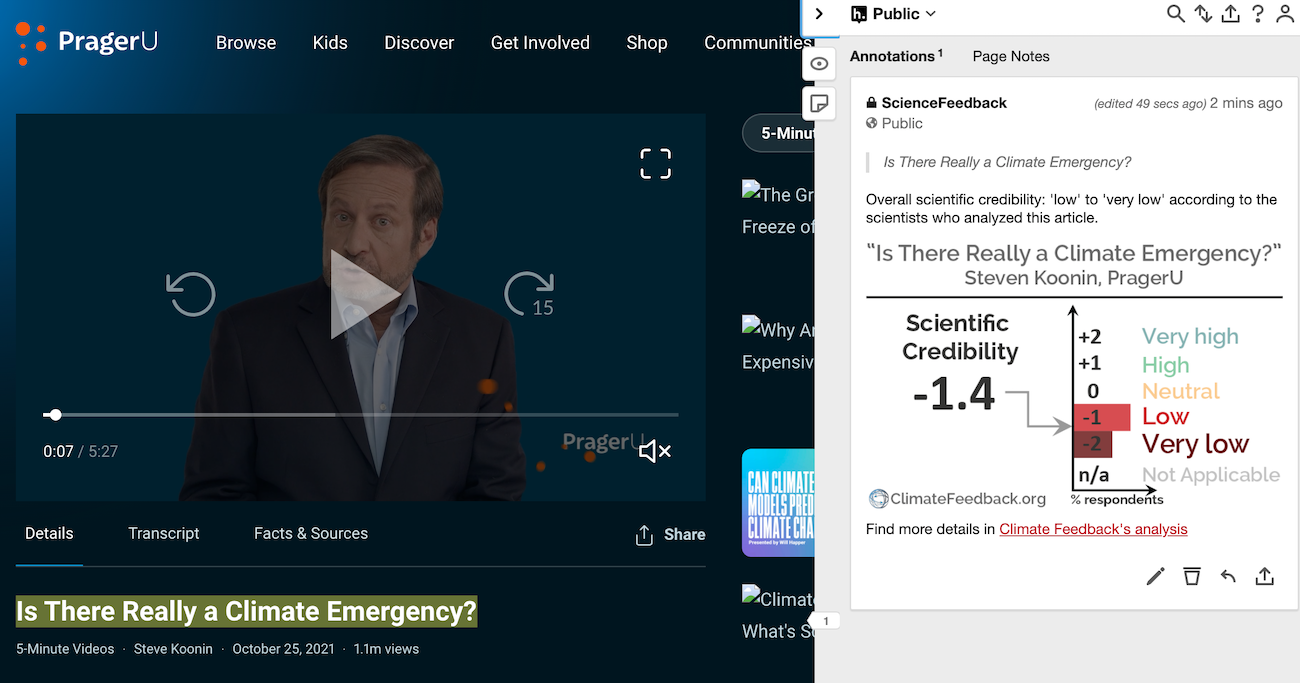
PragerU video on climate change repeats a range of misleading claims by Steven Koonin
“The author of this video, Dr. Steven Koonin, says he is following the scientific reports published by the UN and US government, but by subtly changing wording and choosing not to mention important context this video is very likely to mislead readers.
This style of selective wording and lack of context, an approach called “cherry picking”, applies to every one of Dr. Koonin’s scientific comments.”

NOAA shows clear global warming trends over the past 58 years based on radiosonde data
Claim:
“The 58 year net gain of global temperature is zero. We are simply in a cyclical, normal ebb and flow of temperature.”
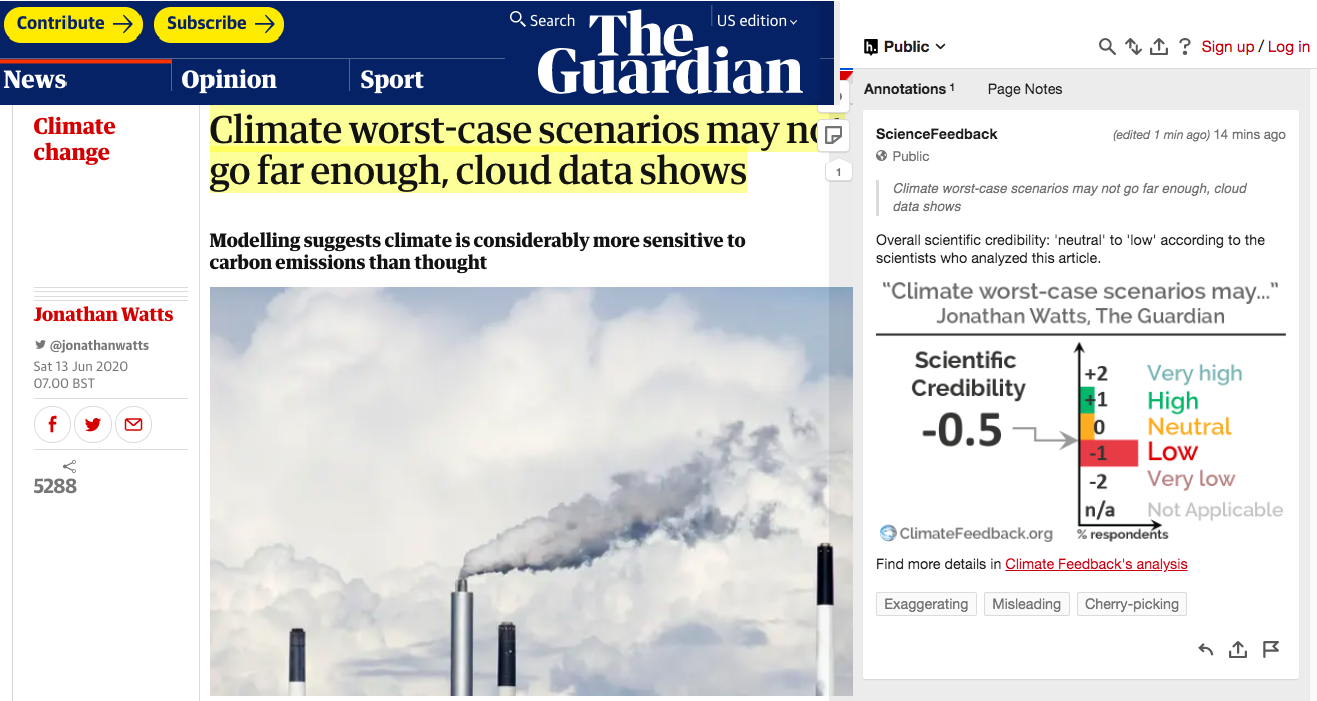
Article in The Guardian misleads readers about sensitivity of climate models by narrowly focusing on single study
“The article correctly reports that the most recent versions of some climate models estimate more warming for a given increase in CO2 concentrations. It is also correct in highlighting that how clouds are represented in these models is the likely reason for these higher estimates. However, it does not report all the science available on this topic and its claims are thus misleading.”
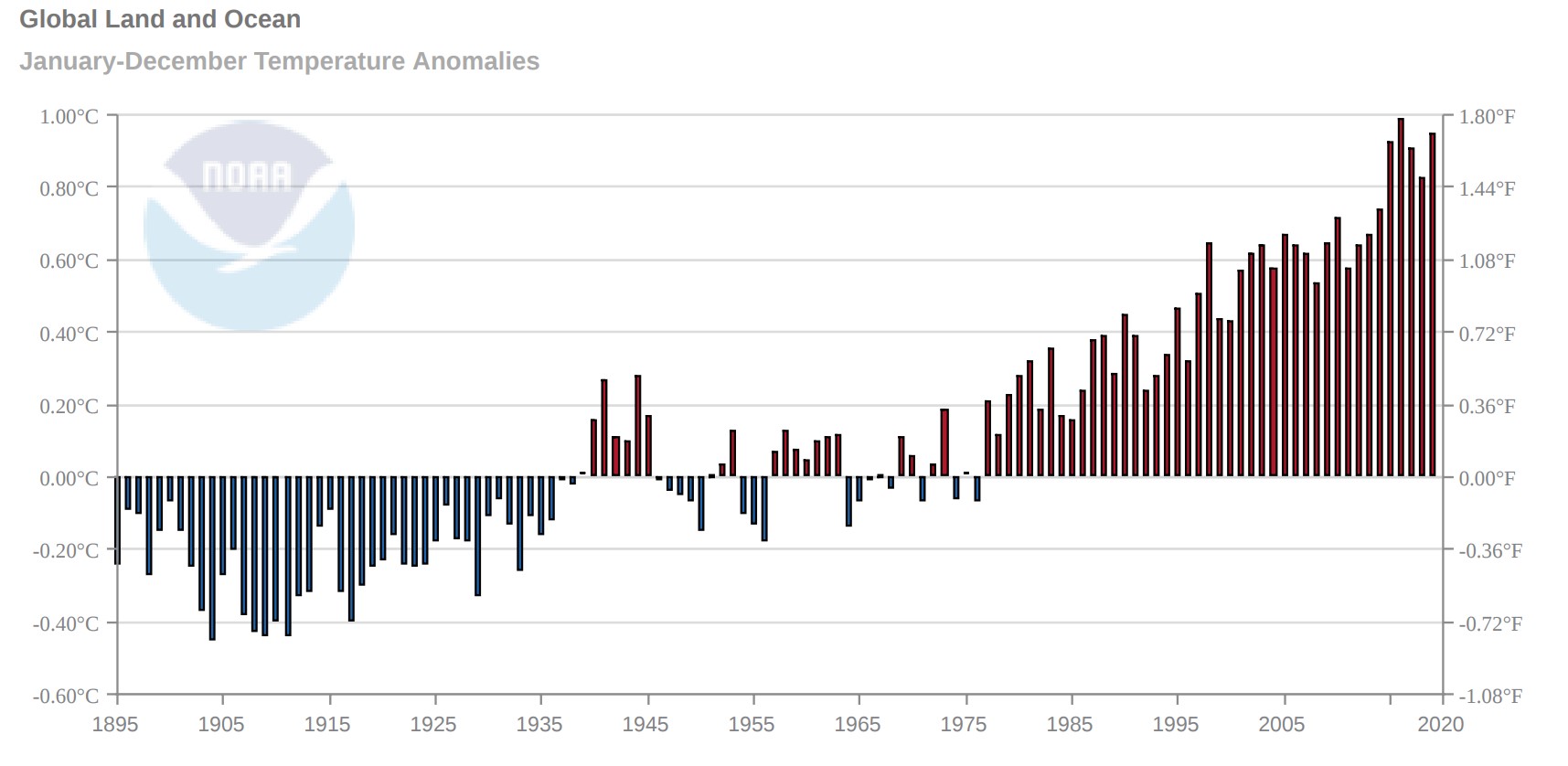
Temperature trends in the U.S. are consistent with warming around the world, contrary to Electroverse claim
Claim:
Historical data of temperature in the U.S. destroys global warming myth
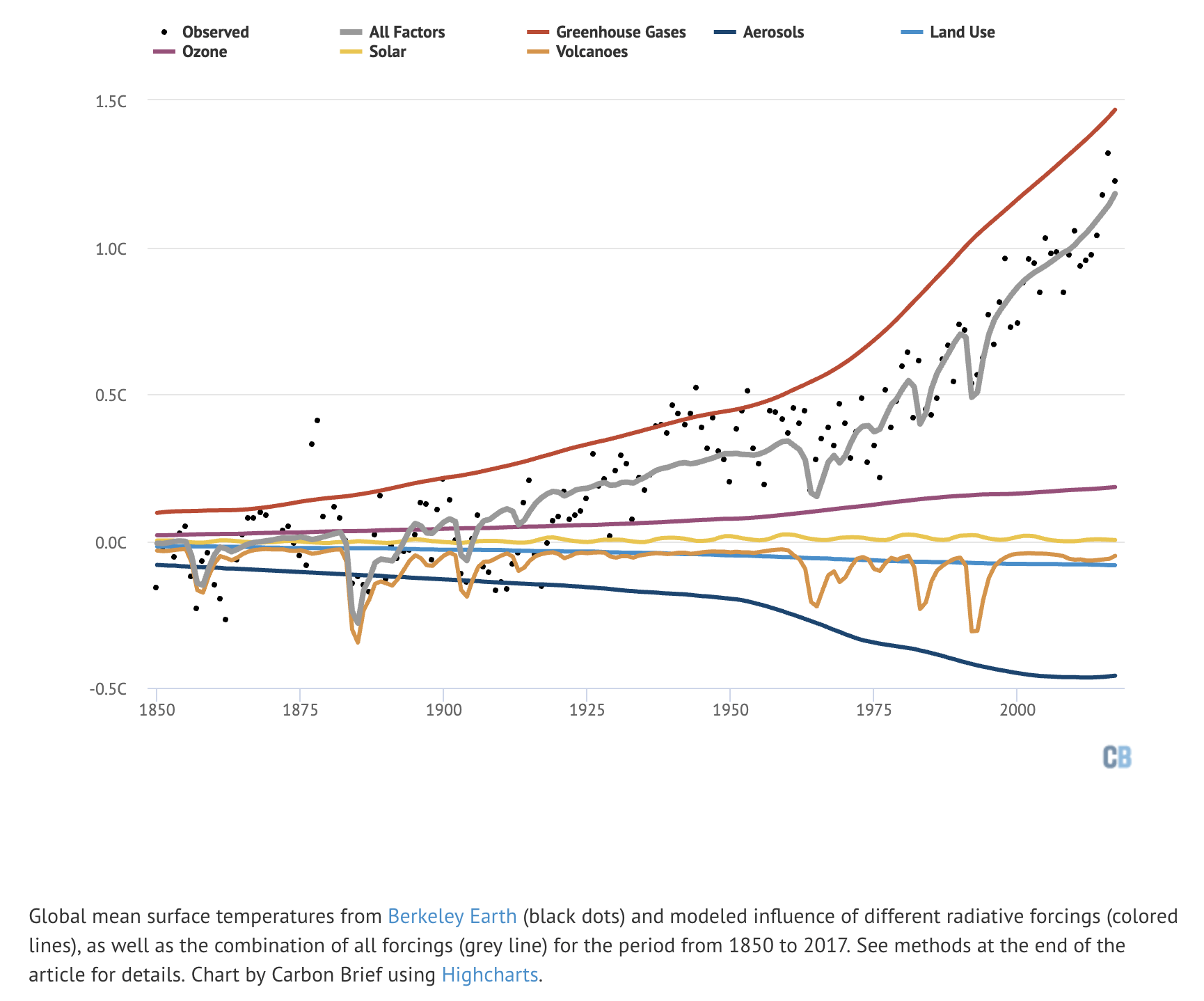
Electroverse article incorrectly claims the Sun is behind climate change
Claim:
the IPCC is wrong − the sun, not CO2, drove modern global warming
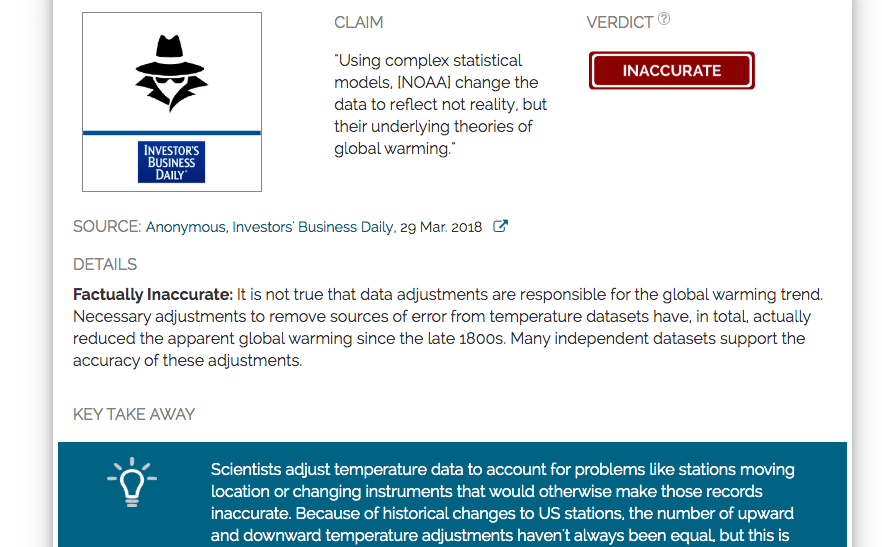
NOAA does not fraudulently adjust data to create the illusion of a global warming trend
Claim:
Using complex statistical models, [NOAA] change[s] the data to reflect not reality, but their underlying theories of global warming.
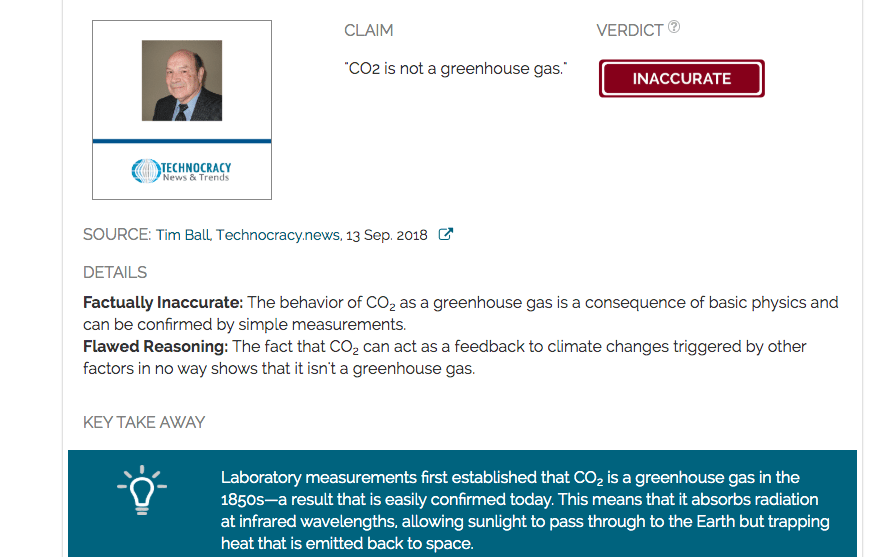
Simple measurements demonstrate that CO2 is a greenhouse gas contrary to claim in online blogs
Claim:
CO2 is not a greenhouse gas.
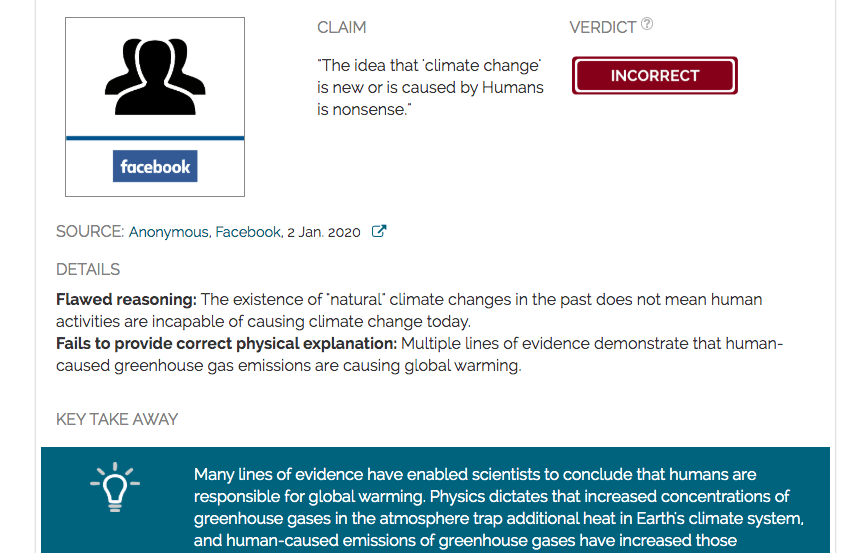
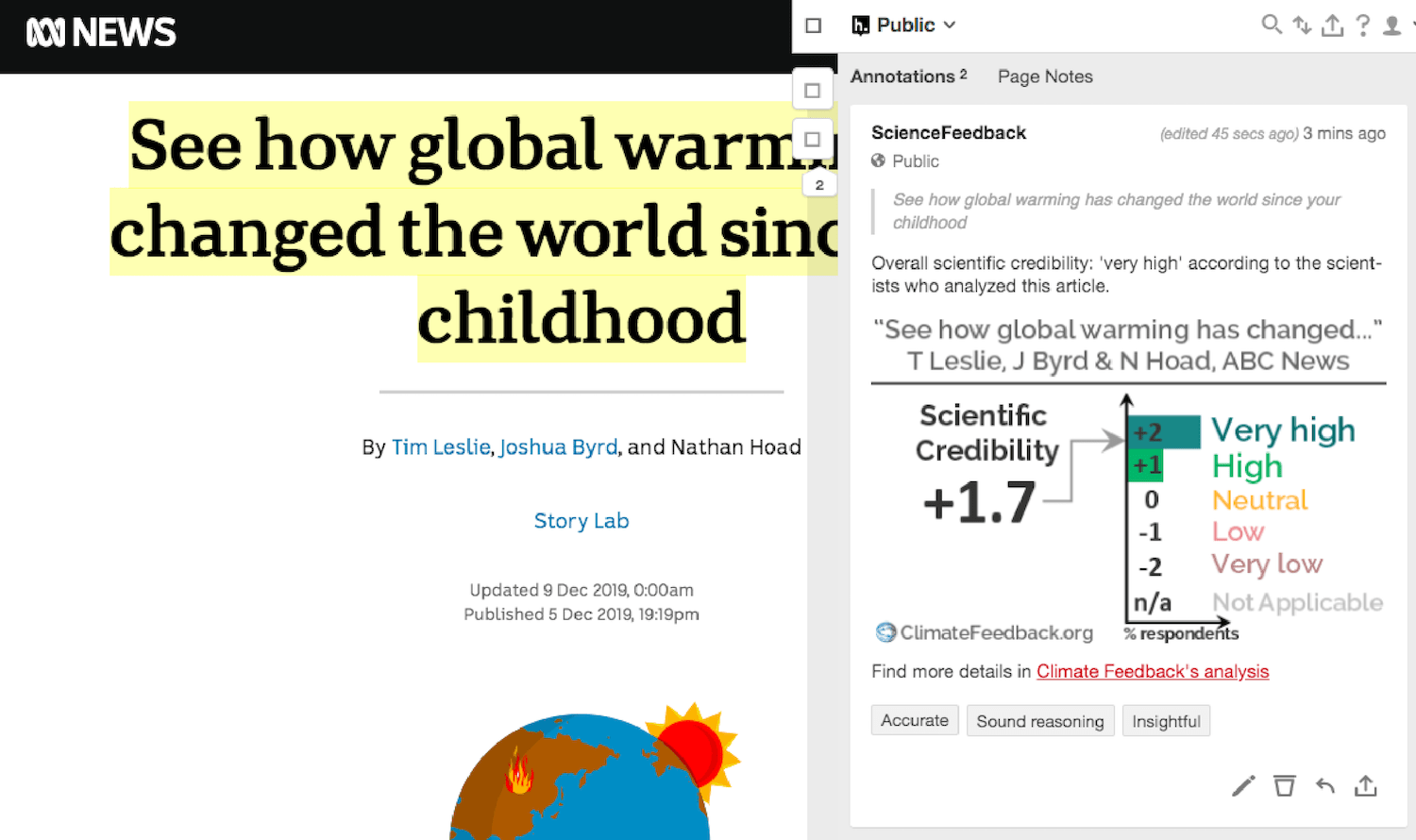
ABC article effectively illustrates important climate trends for Australian readers
“This article is exceptionally good in delivering accurate information in an engaging way. There are many useful statements made about the effects of climate change on extreme weather globally and in Australia and these have been backed up by links to relevant peer-reviewed literature.”
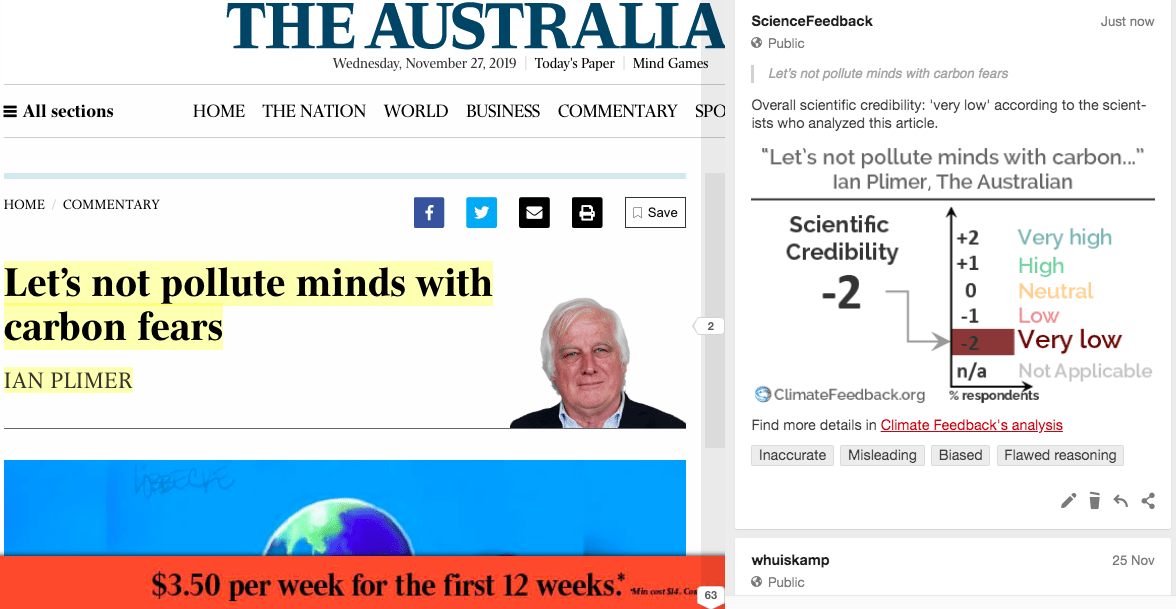
Ian Plimer op-ed in The Australian again presents long list of false claims about climate
“This article is a mixture of misdirection, misleading claims, and outright falsehoods. The author attempts to paint a picture of current climate change as simply a continuation of natural changes that have occurred in the past. But this neglects the clear evidence that climate change over the last two centuries has been shown to be largely man-made, that it is much more rapid that anything we have seen in the last two thousand years if not longer, and that it is occurring in the context of a globe with more than 7 billion human inhabitants.”
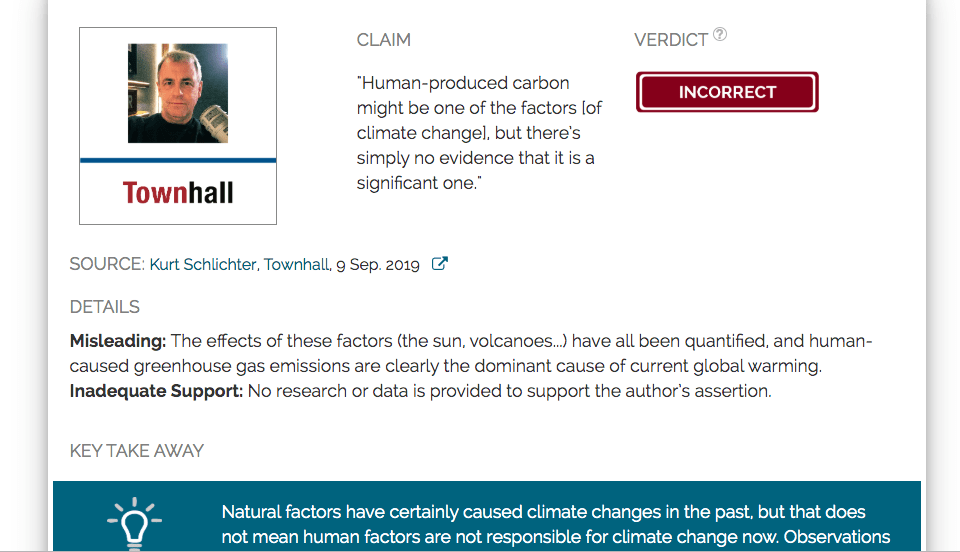
There is overwhelming evidence that current climate change is significantly caused by human carbon emissions contrary to claim in Townhall
Claim:
Human-produced carbon might be one of the factors [of climate change], but there’s simply no evidence that it is a significant one.
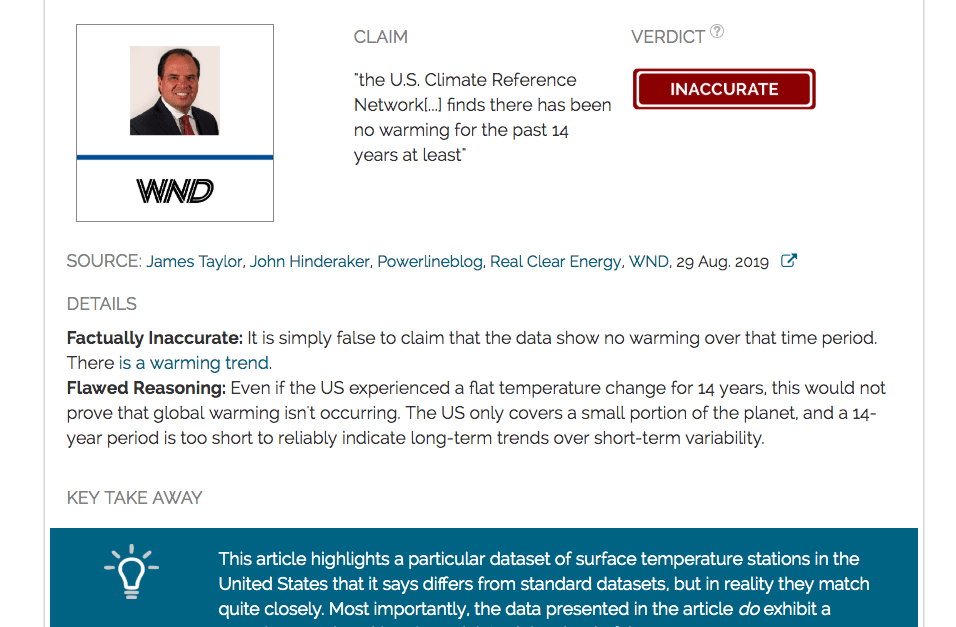
Claim of no US warming since 2005 is directly contradicted by the data it is based on
Claim:
the U.S. Climate Reference Network[...] finds there has been no warming for the past 14 years at least
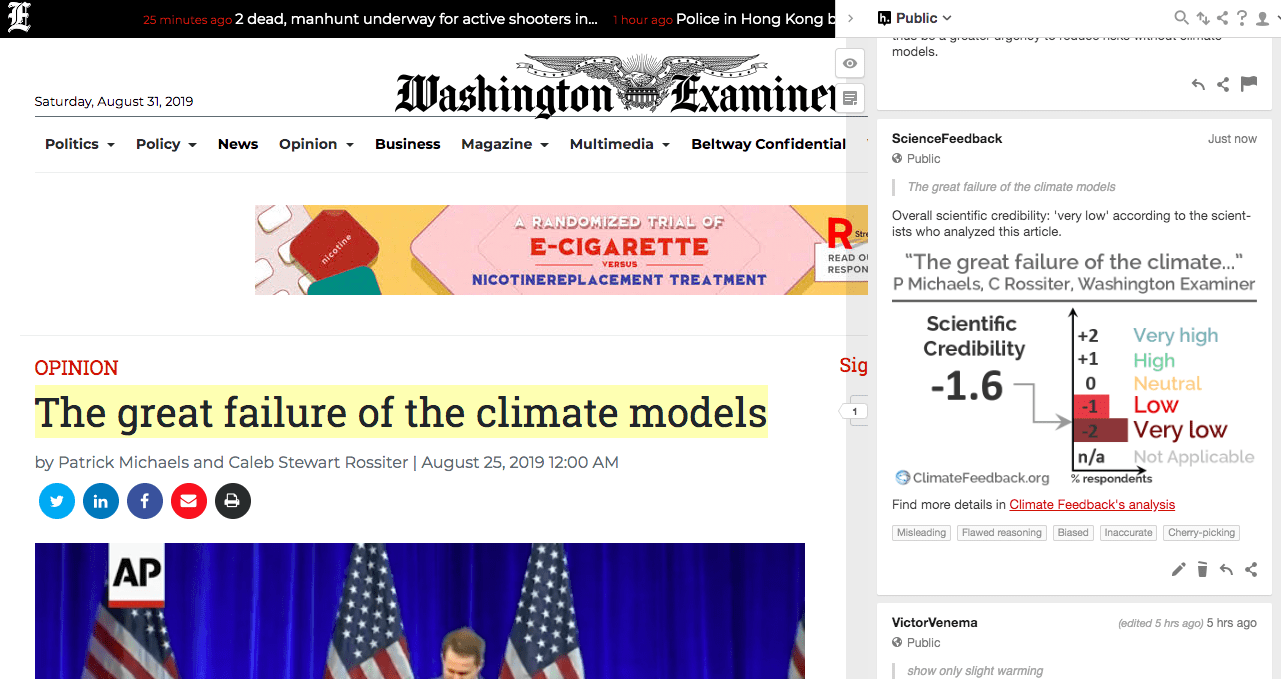
Washington Examiner op-ed cherry-picks data and misleads readers about climate models
“This article focuses only on specific lines of evidence that climate models disagree with observations. In doing so, the authors ignore research that helps to reconcile differences between models and observations. The authors do not consider alternate datasets and time periods in which models and observations agree. Models are one tool for understanding climate change; their overall credibility does not hinge on one variable, in one domain, over a specific time period, with respect to a set of imperfect observations.”
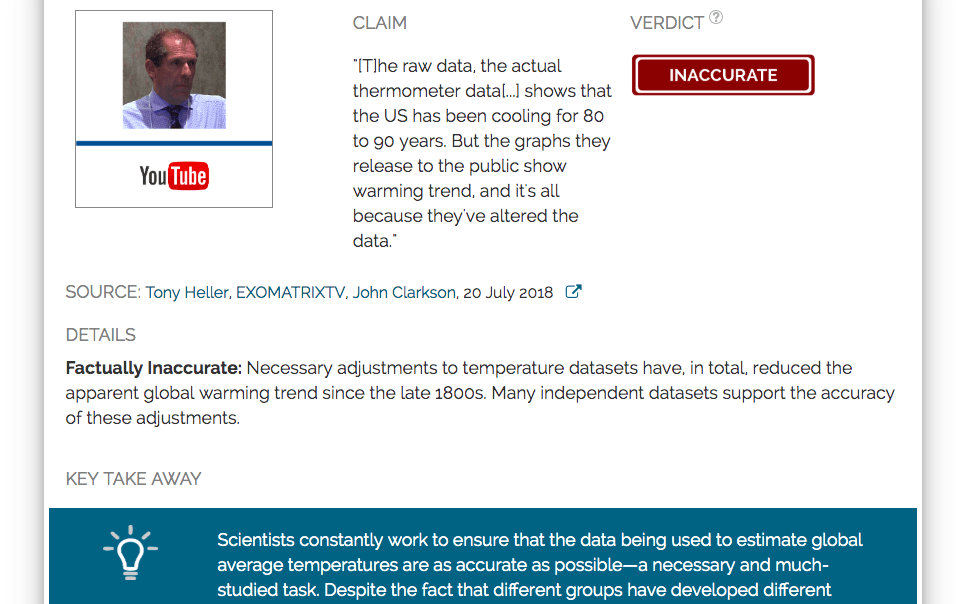
Hosted by former Australian senator, Tony Heller repeats false claim that scientists fake the warming trend
Claim:
[T]he raw data, the actual thermometer data[...] shows that the US has been cooling for 80 to 90 years. But the graphs they release to the public show warming trend, and it's all because they've altered the data.
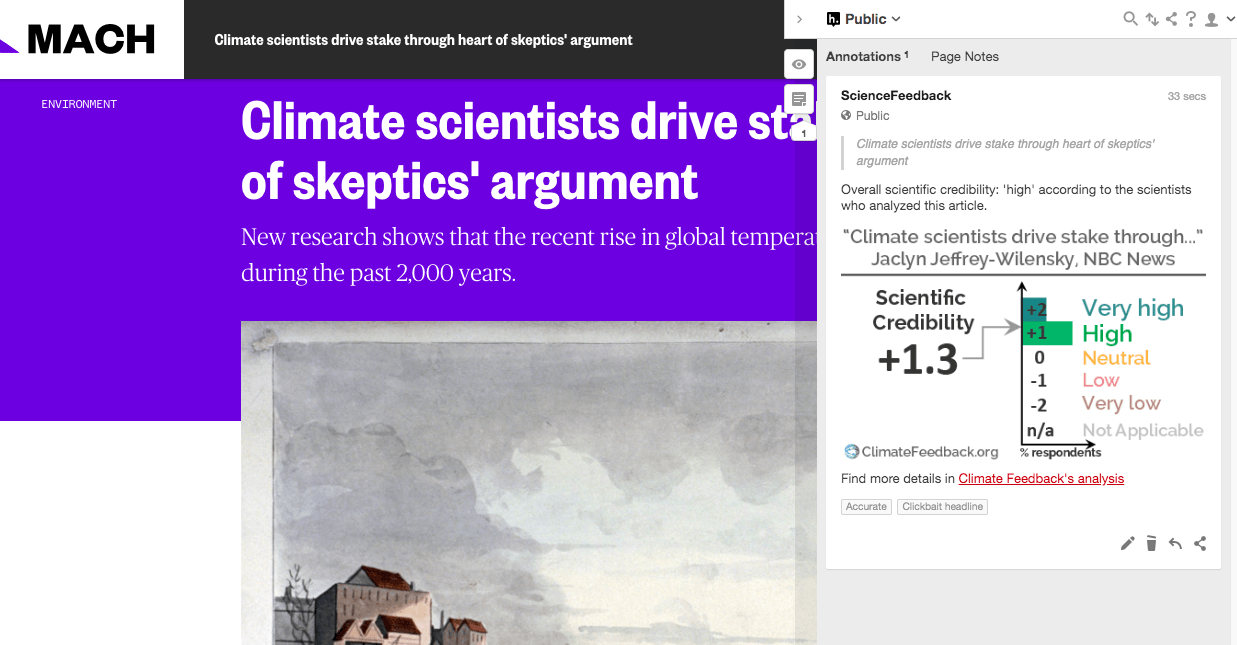
NBC News story accurately covers research on two millennia of climate history
“This accurately describes new peer-reviewed research and asks independent scientists with relevant expertise to provide important context, such as how these results rely on limited southern hemisphere data. Simplifications help readers understand important points without misleading them.”
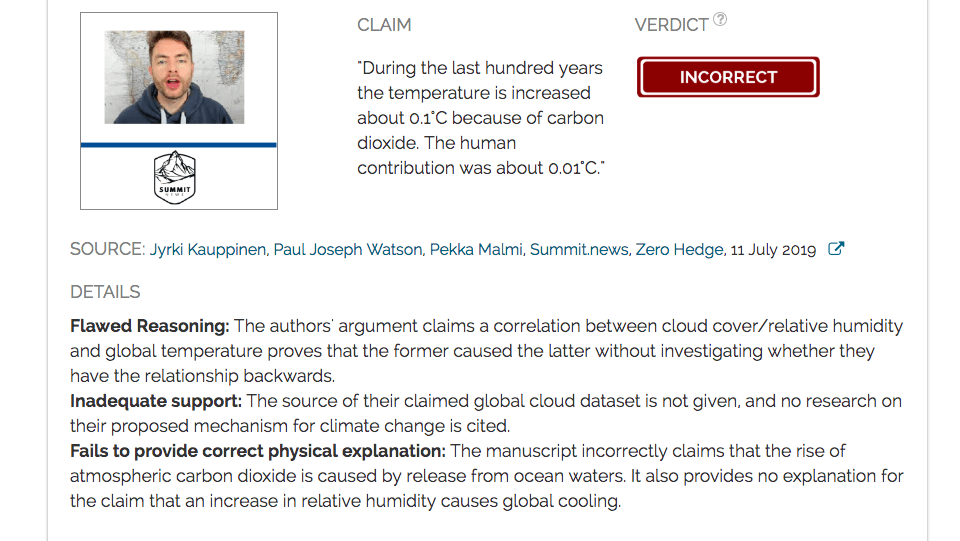
Non-peer-reviewed manuscript falsely claims natural cloud changes can explain global warming
Claim:
During the last hundred years the temperature is increased about 0.1°C because of carbon dioxide. The human contribution was about 0.01°C.
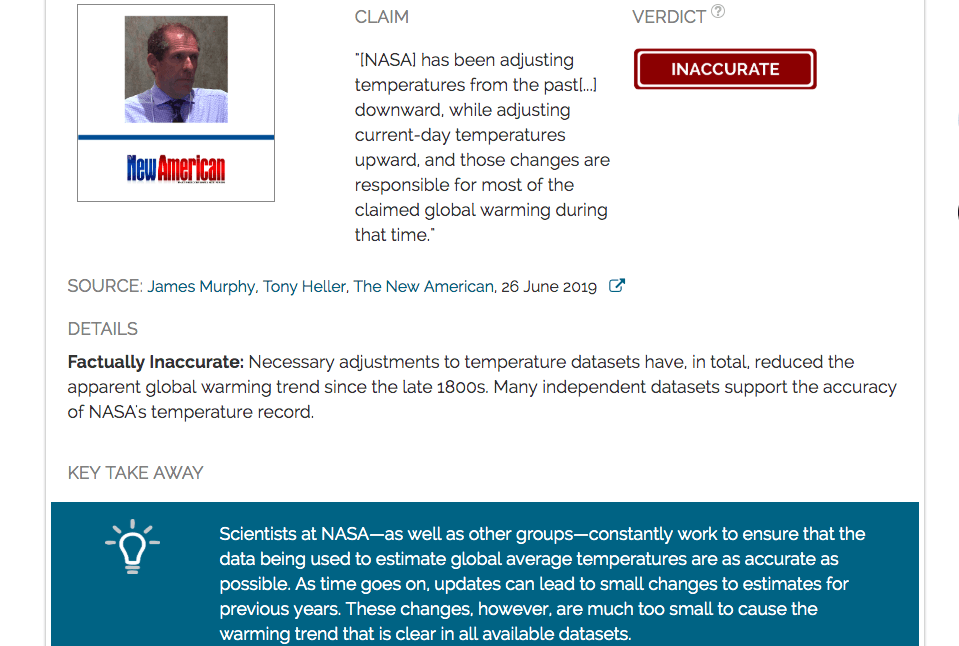
NASA did not create global warming by manipulating data
Claim:
[NASA] has been adjusting temperatures from the past[...] downward, while adjusting current-day temperatures upward, and those changes are responsible for most of the claimed global warming during that time.
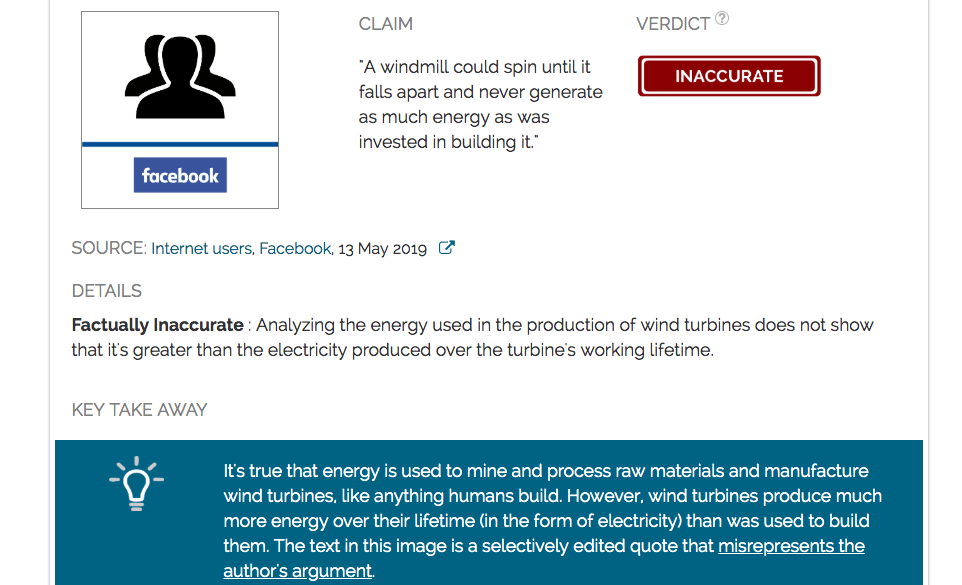
Meme image falsely claims wind turbines produce less energy that is used to build them
Claim:
A windmill could spin until it falls apart and never generate as much energy as was invested in building it.
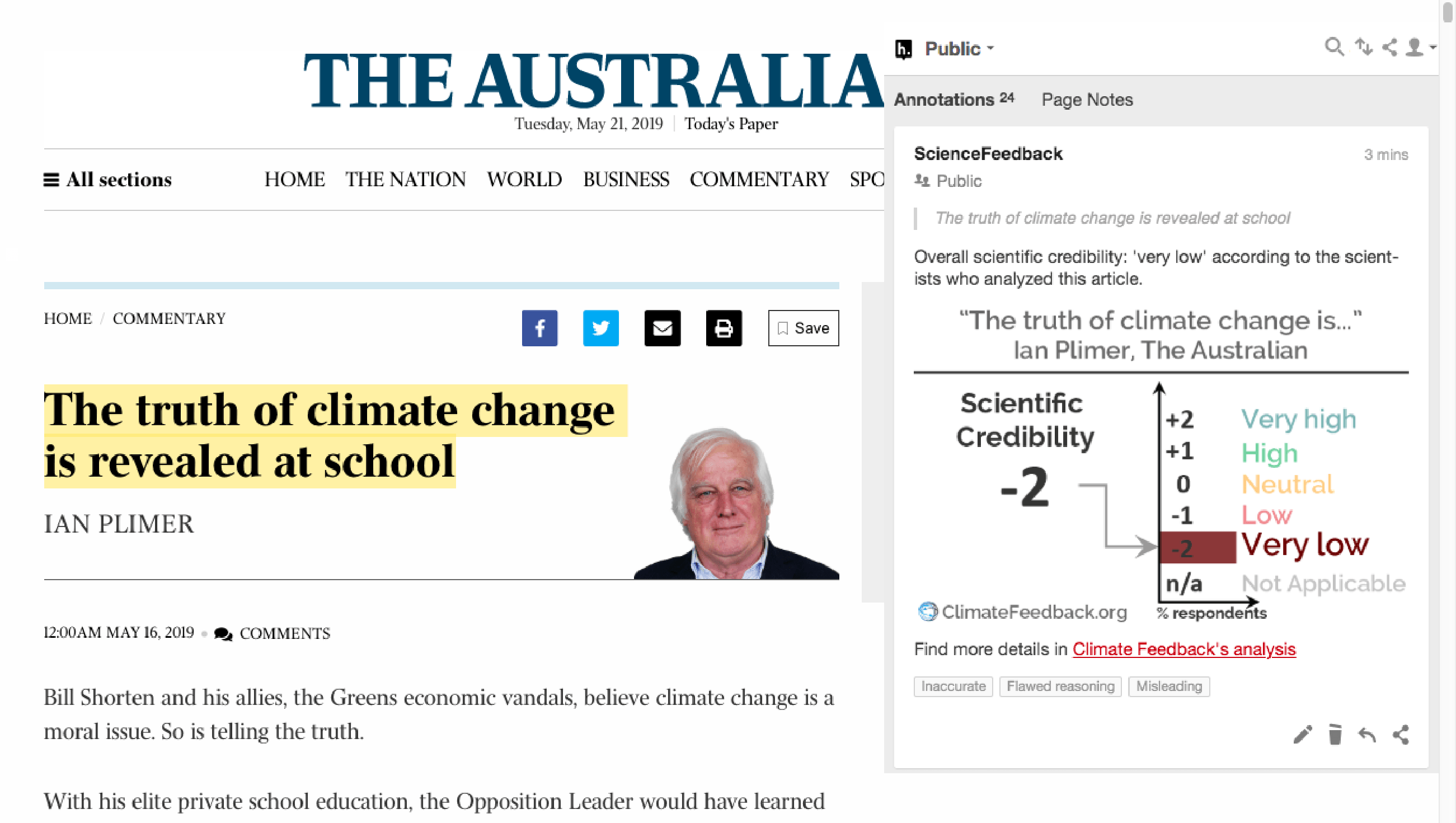
Commentary in The Australian by Ian Plimer relies on false claims to make its case
“If you think that potentially causing hundreds of millions of refugees and trillions of dollars in damages is fine because some plants did well in the same conditions millions of years ago when humans weren’t around, then you could support this article.”
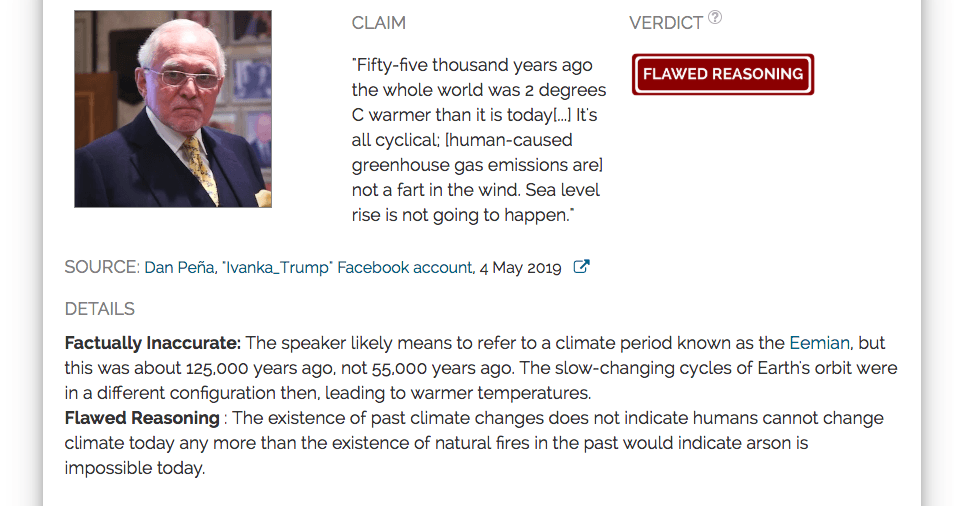
In popular video, Dan Peña falsely claims humans aren't causing climate change
Claim:
Fifty-five thousand years ago the whole world was 2°C warmer than it is today[...] It's all cyclical; [human-caused greenhouse gas emissions are] not a fart in the wind. Sea level rise is not going to happen.
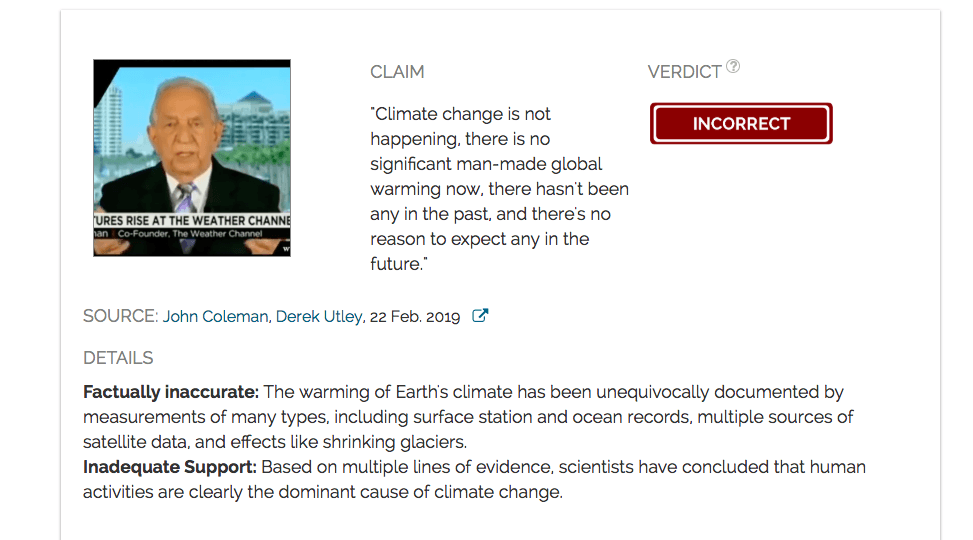
There is clear evidence for the existence of climate change contrary to claims by John Coleman
Claim:
Climate change is not happening, there is no significant man-made global warming now, there hasn't been any in the past, and there's no reason to expect any in the future.
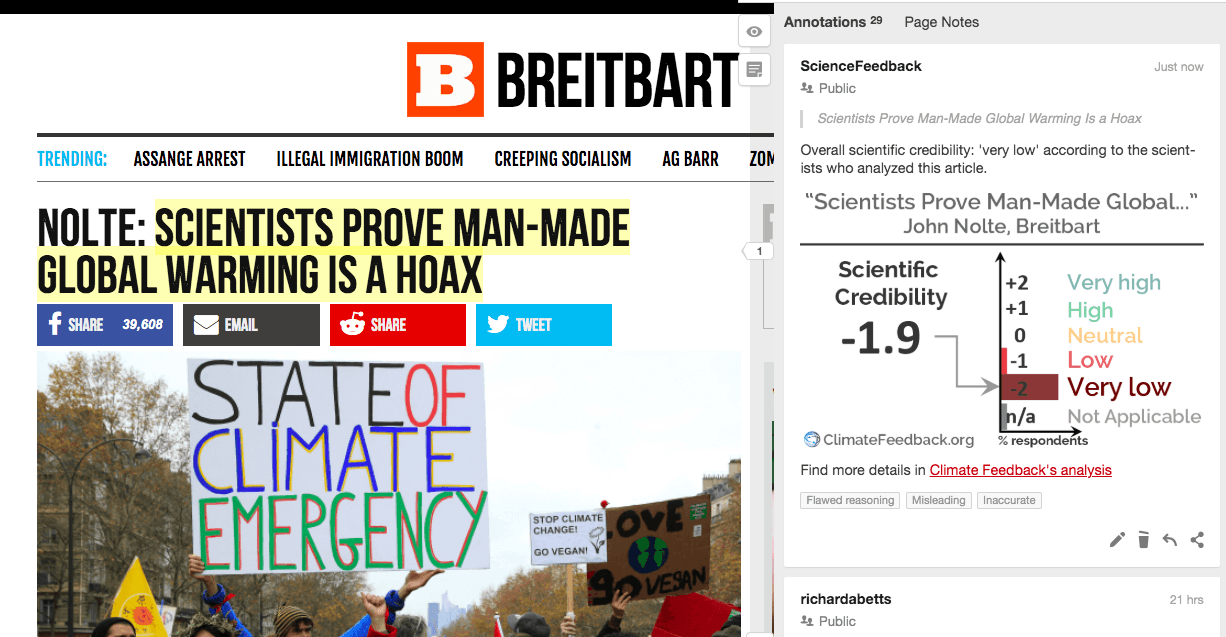
Breitbart article baselessly claims a study of past climate invalidates human-caused climate change
“By the reasoning of this article, if a rock rolled down a hill three million years ago, no human can be responsible for rolling a rock down a hill today. The fallaciousness of this reasoning is astounding.
It is hard to imagine that a well-intentioned person can so profoundly misunderstand the science. Assuming the author is acting in good faith, this article provides evidence that motivated reasoning can produce results that appear delusional to well-informed people.”
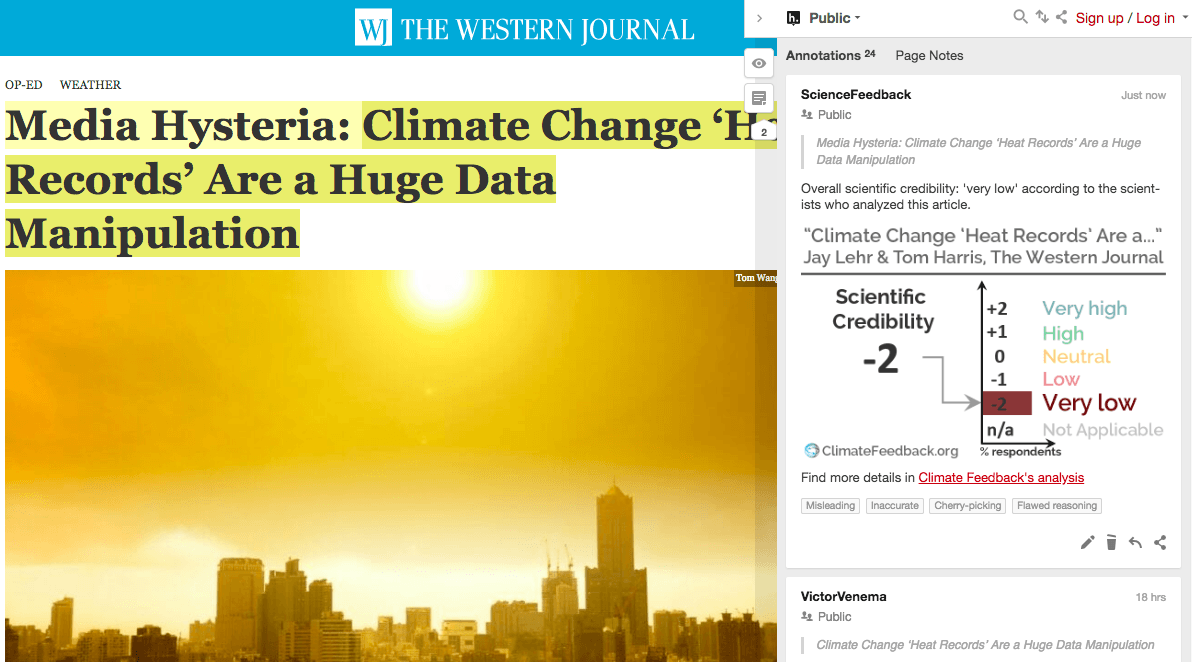
Western Journal op-ed deceives readers with completely unsupported claims
“What would make their case stronger would be if they actually analysed all the data, engaged with the existing scientific literature and made their own contribution to our scientific understanding by publishing a scientific paper. The cherry picking exercise in this Western Journal article does not contribute to our scientific understanding of the world.”
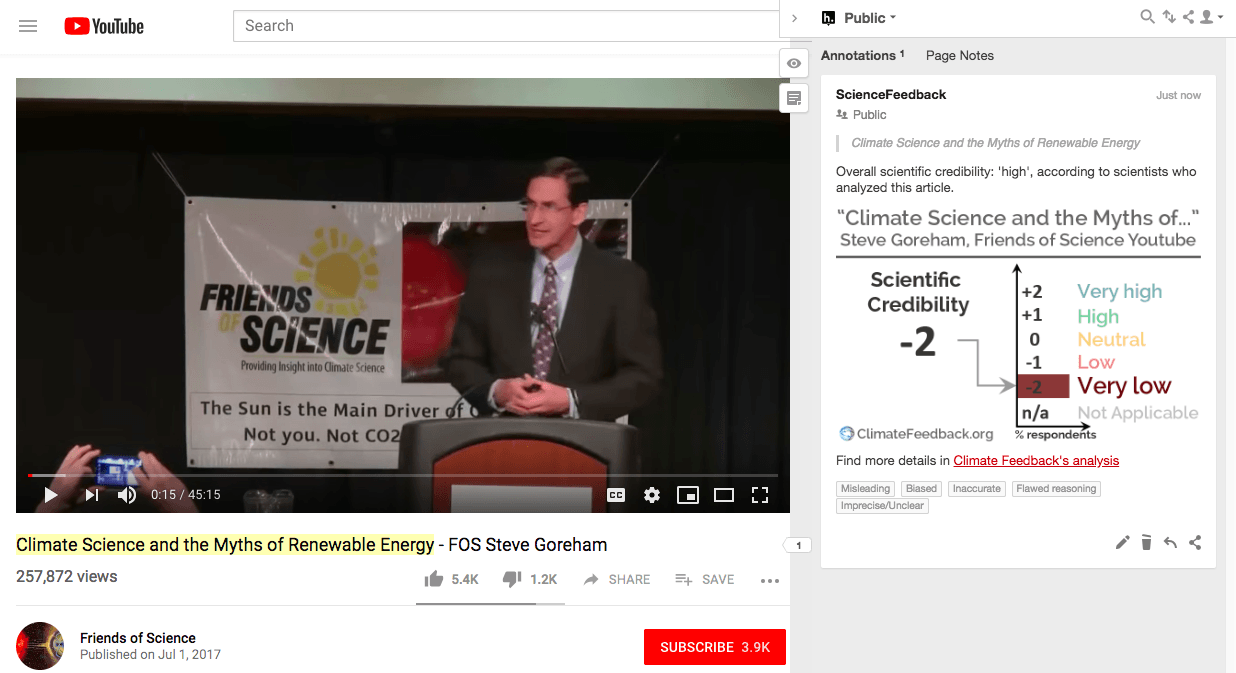
Popular “Friends of Science” video promoted by Youtube presents long list of climate myths
“The video presents a litany of the usual climate denier talking points, none of which hold any water. It is full of outright false claims and does not even shy away from presenting a fake TIME magazine cover that supposedly warned of an ice age. “Friends of Science” is an advocacy group “largely funded by the fossil fuel industry””
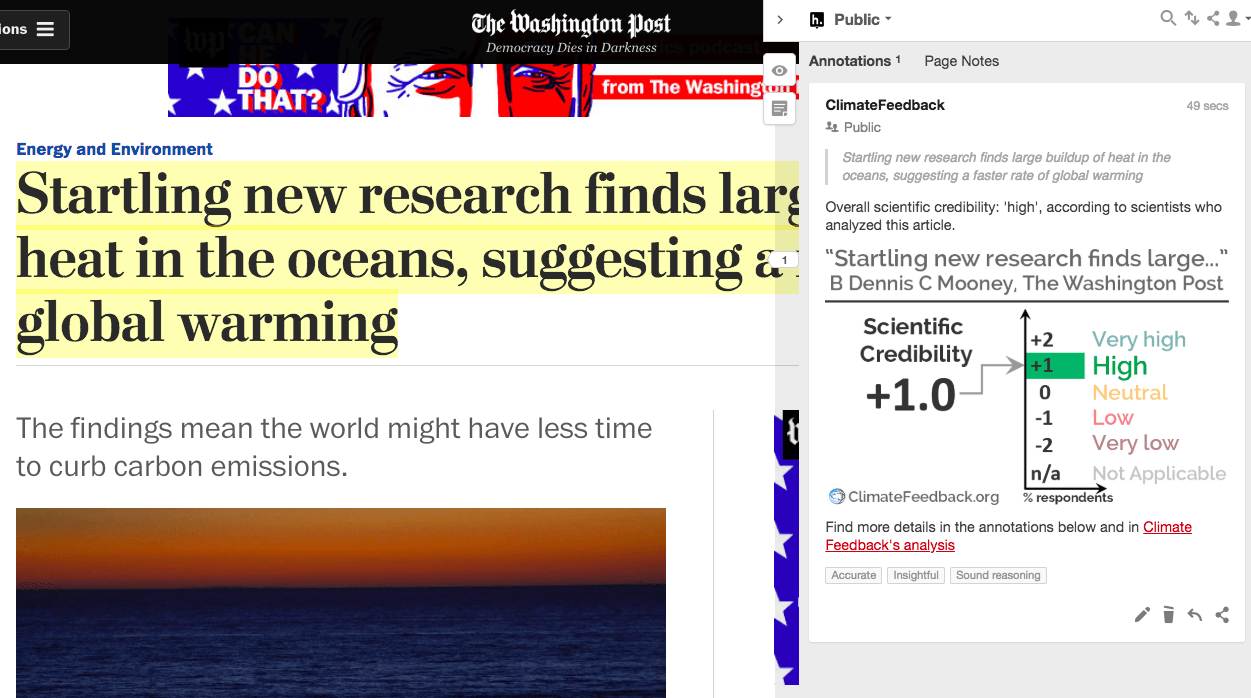
Washington Post accurately describes ocean warming study (which has since been corrected)
“The Washington Post article accurately reports the results and links to other topics using reliable sources. Quotations from Pieter Tans and Paul Durack add important caveats showing that this is strong new evidence but not the final say. This caution is vital for readers to interpret the findings.”
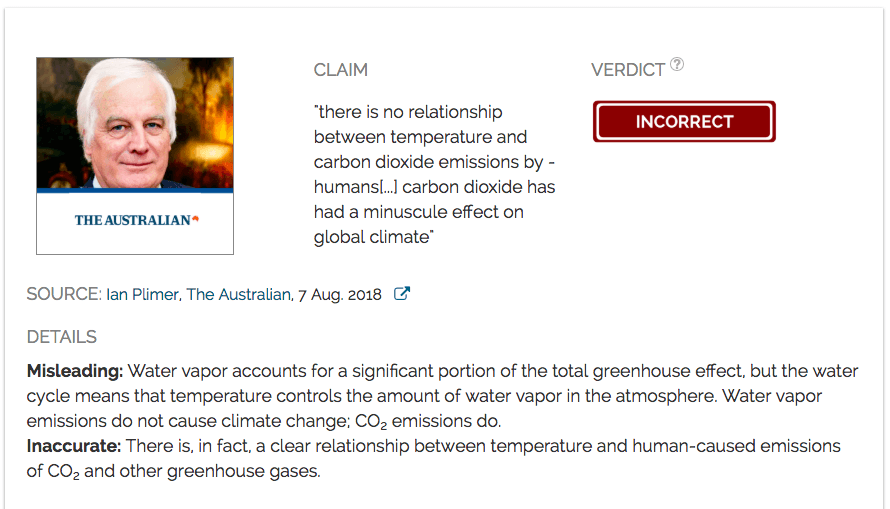
Ian Plimer wrongly claims that carbon dioxide emissions do not cause climate change
Claim:
there is no relationship between temperature and carbon dioxide emissions by humans[...] carbon dioxide has had a minuscule effect on global climate
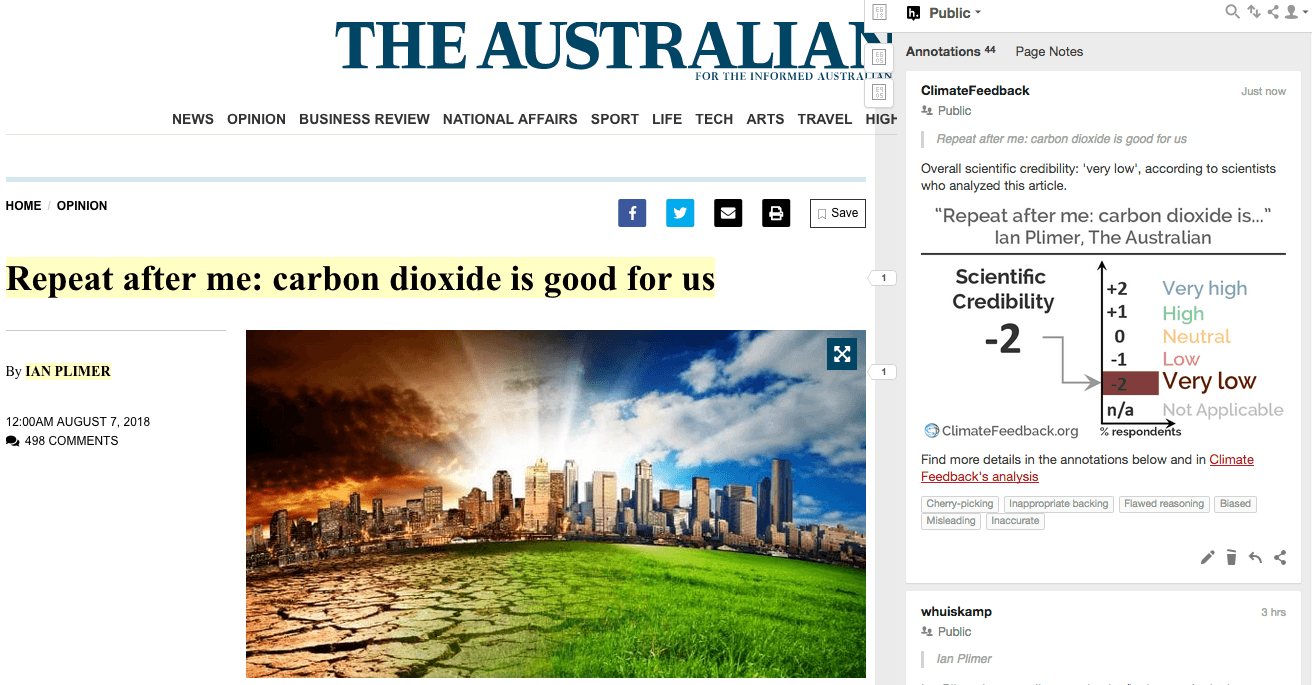
The Australian publishes "deeply ill-informed" opinion on climate by Ian Plimer
“This article is an amalgamation of logical fallacies, misleading talking points, and downright factually incorrect statements regarding the physics of the climate system. Every talking point in this article has been debunked many times over and it is astonishing that this was published.”
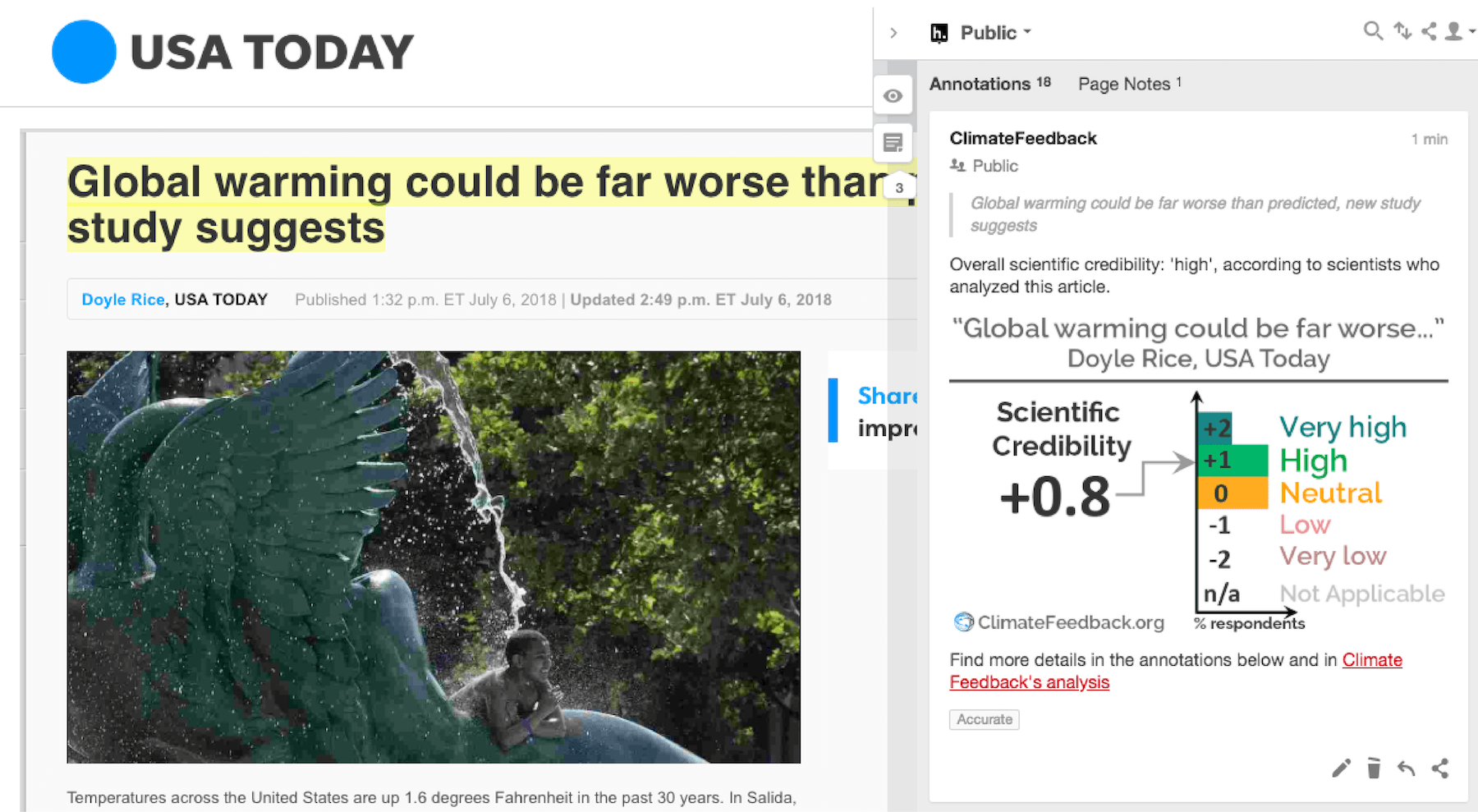
USA Today story accurate but lacks clarity regarding timescales over which warming could be underestimated
“An accurate and balanced article that gives readers a good flavour of the research but the reference to “Earth’s history” might confuse some when it otherwise refers to the studied period: the past 3.5 million years. Neatly explains a lot of the key points in a small word count, but…”
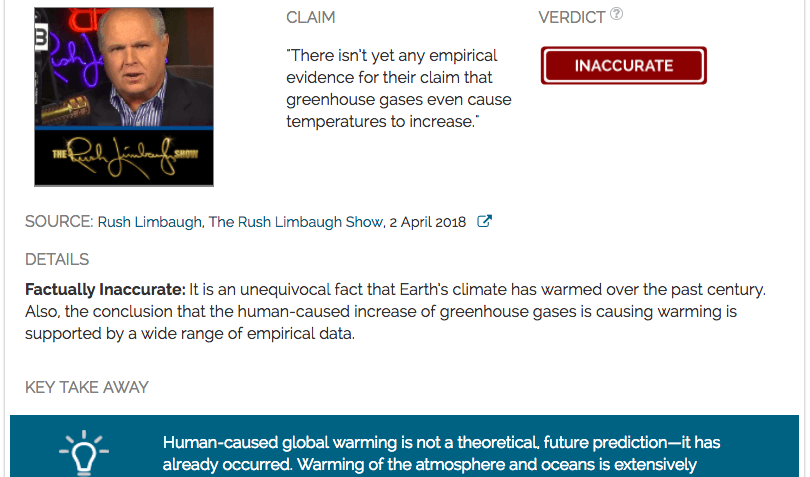
Rush Limbaugh falsely claims there is no evidence of human-caused global warming
Claim:
There isn’t yet any empirical evidence for their claim that greenhouse gases even cause temperatures to increase.
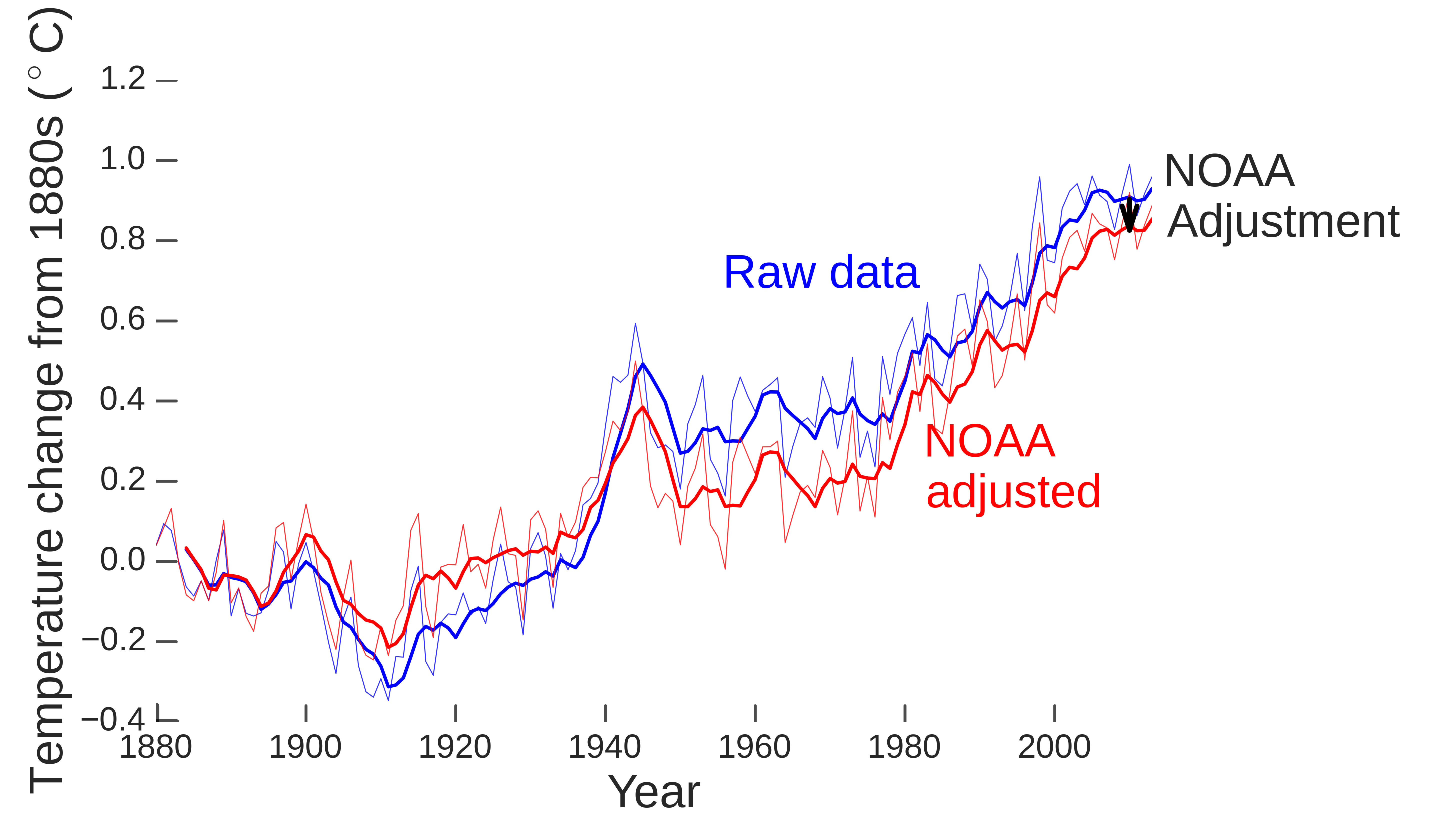
Breitbart repeats blogger’s unsupported claim that NOAA manipulates data to exaggerate warming
Claim:
NOAA has adjusted past temperatures to look colder than they were and recent temperatures to look warmer than they were.

